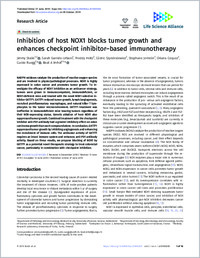Inhibition of host NOX1 blocks tumor growth and enhances checkpoint inhibitor–based immunotherapy
- Stalin, Jimmy Department of Pathology and Immunology, Medical Faculty, University of Geneva, Geneva, Switzerland - Department of Oncology, Microbiology and Immunology, Faculty of Science and Medicine, University of Fribourg, Fribourg, Switzerland
- Garrido-Urbani, Sarah Department of Pathology and Immunology, Medical Faculty, University of Geneva, Geneva, Switzerland
- Heitz, Freddy Genkyotex S.A Forum 2, Archamps Technopole, Saint-Julien-en-Genevois, France
- Szyndralewiez, Cédric Genkyotex S.A Forum 2, Archamps Technopole, Saint-Julien-en-Genevois, France
- Jemelin, Stephane Department of Pathology and Immunology, Medical Faculty, University of Geneva, Geneva, Switzerland
- Coquoz, Oriana Department of Oncology, Microbiology and Immunology, Faculty of Science and Medicine, University of Fribourg, Fribourg, Switzerland
- Rüegg, Curzio Department of Oncology, Microbiology and Immunology, Faculty of Science and Medicine, University of Fribourg, Fribourg, Switzerland
- Imhof, Beat A. Department of Pathology and Immunology, Medical Faculty, University of Geneva, Geneva, Switzerland - Medicity Research Laboratory, University of Turku, Turku, Finland
-
01.08.2019
Published in:
- Life Science Alliance. - 2019, vol. 2, no. 4, p. e201800265
English
NADPH oxidases catalyze the production of reactive oxygen species and are involved in physio/pathological processes. NOX1 is highly expressed in colon cancer and promotes tumor growth. To investigate the efficacy of NOX1 inhibition as an anticancer strategy, tumors were grown in immunocompetent, immunodeficient, or NOX1-deficient mice and treated with the novel NOX1-selective inhibitor GKT771. GKT771 reduced tumor growth, lymph/angiogenesis, recruited proinflammatory macrophages, and natural killer T lymphocytes to the tumor microenvironment. GKT771 treatment was ineffective in immunodeficient mice bearing tumors regardless of their NOX-expressing status. Genetic ablation of host NOX1 also suppressed tumor growth. Combined treatment with the checkpoint inhibitor anti-PD1 antibody had a greater inhibitory effect on colon carcinoma growth than each compound alone. In conclusion, GKT771 suppressed tumor growth by inhibiting angiogenesis and enhancing the recruitment of immune cells. The antitumor activity of GKT771 requires an intact immune system and enhances anti-PD1 antibody activity. Based on these results, we propose blocking of NOX1 by GKT771 as a potential novel therapeutic strategy to treat colorectal cancer, particularly in combination with checkpoint inhibition.
- Faculty
- Faculté des sciences et de médecine
- Department
- Médecine 3ème année
- Language
-
- English
- Classification
- Biological sciences
- License
-
License undefined
- Identifiers
-
- RERO DOC 327456
- DOI 10.26508/lsa.201800265
- Persistent URL
- https://folia.unifr.ch/unifr/documents/308274
Statistics
Document views: 176
File downloads:
- pdf: 218
